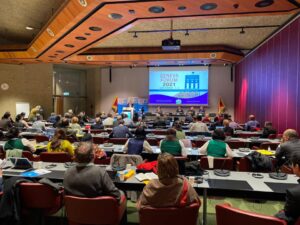
Photo: CTA
The fourth Geneva Forum, an annual event where diverse groups of human rights experts, practitioners, academics, activists, governments, diplomats, think tanks, civil society groups and affected groups are brought together to monitor and evaluate the human rights situation in regions under the rule of the Chinese Communist Party (CCP), was concluded on November 2. This year’s Forum focused its discussions on economic, social and cultural rights violations by China.
Sikyong Penpa Tsering, the democratically elected President of the Central Tibetan Administration (CTA), also known as the Tibetan Government-in-exile, in his inaugural address expressed solidarity with Tibetans living inside Tibet who are going through physical and mental suffering on daily basis under the Chinese régime.
He spoke of Tibetans who, unable to “express the anguish and grievances […] have resorted to self-immolations and so far, 155 Tibetans have self-immolated to oppose the Chinese régime,” said Sikyong, continuing, “They have burnt themselves in the hope that the Chinese government will pay attention to their plight and resolve the Tibetan issue”.
Calling on the United Nation’s reluctance to confront China on its human rights abuses in Tibet over the years he said, “there is a certain feeling that the UN is a little undemocratic in its functioning,” and added that the UN was “unequal in many ways, especially for people who are incarcerated and suppressed, as they are often found without space for representation and space to express their grievances to the world community”.
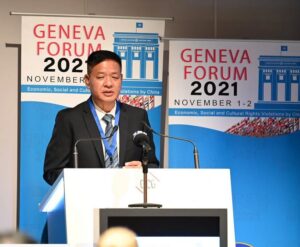
Sikyong Penpa Tsering
Photo: CTA
Sikyong also highlighted the erasure of Tibetan language which is integral to Tibetan identity and the degradation of Tibet’s environment, including the resettlement of Tibetan nomads, a policy which deprives Tibetans of the opportunity to take care of their own environment.
On the first day, the Forum held a special panel discussion on the 11th Panchen Lama entitled Tibet’s Stolen Child – XIth Panchen Lama Gedhun Choekyi Nyima. Gedhun Choekyi Nyima was abducted by the Chinese government at the age of six in May 1996 after His Holiness the Dalai Lama recognised him as the reincarnation of the 10th Panchen Lama. Since then, no information of his wellbeing or whereabouts has been released by China. The Secretary of Department of Information and International Relations of the CTA, Karma Choeying, said that despite a number of calls by the UN and international rights groups, China continuously refuses to give any satisfactory response to their queries.
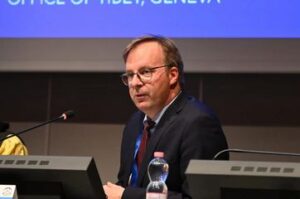
Kai Mueller
Photo: CTA
Kai Mueller, Executive Director of the International Campaign for Tibet Germany, spoke on the legal perspective of the case of the Panchen Lama. He said that, according to Article 17 of the UN Declaration on the Protection of all Persons from Enforced Disappearance, which he quoted,“as constituting enforced disappearance shall be considered a continuing offence as long as the perpetrators continue to conceal the fate and whereabouts of the person(s) who have disappeared, and these facts remain unclarified.” Mr Mueller said that “the disappearance of Gedhun Choekyi Nyima in 1996 is a continuous crime with a victim and with perpetrators” and continued, “Here, the victims are Gedhun Chokeyi Nyima and his family on the one hand, and as perpetrators, are those who ordered and carried out the disappearance at the time. The ones who are responsible over time and today for concealing the fate of Gedhun Chokeyi Nyima are perpetrators. Those are the relevant representatives of the Chinese authorities of the time, over time, and today. This fact should be very clear to the international community”.
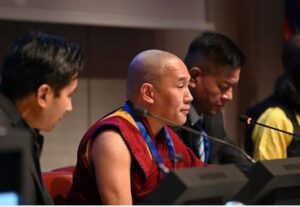
Zeekyab Rinpoche
Photo: CTA
Zeekyab Rinpoche, the abbot of Tashi Lhunpo Monastery based in Bylakuppe, South India, spoke of the historical bond shared by the Panchen Lama lineages and that of successive Dalai Lamas over four centuries. Tashi Lhunpo Monastery in Tibet is the traditional seat of the Panchen Lama lineage. Rinpoche described the “enforced disappearance of the 11th Panchen Lama as one of the darkest periods in Tibetan history.” He spoke of“the agony of the Tibetan people” concerning the abduction and appealed to the United Nations and global leaders to urge China to release the Panchen Lama.
Dr Micheal van Walt van Praag discussed his latest book Tibet Brief: 20/20 in a special session If Tibet was Water Under the Bridge, Think Again on the second day of the forum.He is the Executive President of Kreddha, and Senior Fellow of the Sompong Sucharitkul Center for Advanced International Legal Studies.
He said that his research had found that at no point in history was Tibet ever part of China, and said that his book will bring clarity on the issue of Sino-Tibetan conflict which will help with the need to counter China’s effective propaganda. He continued, saying that China’s rule of Tibet as illegal under international law, explaining that no country can acquire sovereignty over a territory through aggression which means that legally Tibet is an occupied state.
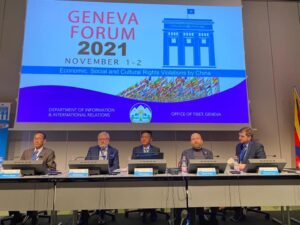
Photo: CTA
The Forum concluded with the issue of a joint statement containing a call for international support for the Tibetan cause and recognition of China’s human rights violations, its repression and cultural genocide, its continued holding of the Panchen Lama.
The two-day Geneva Forum 2021 is jointly organised by the Tibet Bureau Geneva and the CTA’s Department of Information and International Relations with an aim to build a network of organisations and experts focusing on human rights and religious freedom in China.




 Print
Print Email
Email